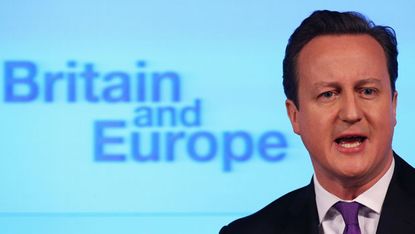ECHR: is Tory plan to snub EU court a 'legal car crash'?
David Cameron wants to curb the European Court of Human Rights but not everyone in his party backs the plan

Prime Minister David Cameron is considering plans to limit the power of the European Court of Human Rights (ECHR) in the UK.
Conservative lawyers have proposed a new law that would reassert the control of British Parliament, preventing foreign judges from having the final say on human rights issues in this country.
But some MPs within his party are not convinced that the new proposals can work...
Subscribe to The Week
Escape your echo chamber. Get the facts behind the news, plus analysis from multiple perspectives.

Sign up for The Week's Free Newsletters
From our morning news briefing to a weekly Good News Newsletter, get the best of The Week delivered directly to your inbox.
From our morning news briefing to a weekly Good News Newsletter, get the best of The Week delivered directly to your inbox.
Why does Cameron want reform?
The Prime Minister and many other Tory ministers are infuriated by the number of criminals and suspected criminals who escape deportation because of their "right to family life" under the European Convention. The long and expensive battle to deport radical cleric Abu Qatada, for example, led to clashes between ministers and the ECHR. Other rulings from Strasbourg, such as the order to give prisoners the vote, have angered many Conservatives. This has convinced Cameron that he should not only repeal the Human Rights Act, introduced by Labour in 1998, but also limit the powers of the ECHR.
What are the Conservatives proposing?
The Prime Minister is widely expected to scrap the Human Rights Act and declare a British Bill of Rights as a manifesto commitment ahead of next year's election. The proposed law, drawn up by Conservative lawyers, would reportedly give the UK the ability to disregard rulings from the ECHR, with the British Bill of Rights taking precedence over decisions from the Strasbourg court.
What would this mean?
According to the BBC, the lawyers have acknowledged that this would either force changes in the way the Strasbourg court operates or lead to the UK being expelled from the Council of Europe, the international body that Britain helped to found and which aims to uphold human rights across the continent.
How are people reacting?
Former Attorney General Dominic Grieve has warned his Conservative colleagues that the proposal is a "legal car crash with a built-in time delay". He believes it is an "incoherent" policy to remain a signatory to the convention but refuse to recognise the court's rulings. "If we send out a sign that human rights don't matter, that is likely to be picked up in other countries which are also signatory states such as Russia," he adds. Former Cabinet minister Ken Clarke has also said it is "unthinkable" for Britain to leave the convention, pointing out that it was "drafted by British lawyers after the Second World War in order to protect the values for which we fought the war".
The BBC's Nick Robinson notes that Grieve and Clarke have left the Cabinet in this week's reshuffle, along with William Hague, who had also voiced support for the ECHR – while Home Secretary Theresa May and Justice Secretary Chris Grayling, who have long been critical of the human rights court, retained their positions. "The obstacles to the plan David Cameron wants to unveil all seem to have been removed," says Robinson.
But Anoosh Chakelian in the New Statesman says that pulling out of the ECHR could ultimately do little for Parliament's so-called sovereignty, with high-profile cases such as Qatada's remaining just as difficult. "English Common Law, on which the Convention was based, actually itself embraces the same rights," criminal lawyer Michael Mansfield says. "Is there an English right to life that is different to everybody else's?"
Create an account with the same email registered to your subscription to unlock access.
Sign up for Today's Best Articles in your inbox
A free daily email with the biggest news stories of the day – and the best features from TheWeek.com
-
 The week's best photos
The week's best photosIn Pictures A flooded island, a ballistic missile, and more
By Anahi Valenzuela, The Week US Published
-
 Who actually needs life insurance?
Who actually needs life insurance?The Explainer If you have kids or are worried about passing on debt, the added security may be worth it
By Becca Stanek, The Week US Published
-
 Sexual wellness trends to know, from products and therapies to retreats and hotels
Sexual wellness trends to know, from products and therapies to retreats and hotelsThe Week Recommends Talking about pleasure and sexual health is becoming less taboo
By Theara Coleman, The Week US Published
-
 Myanmar: the Spring Revolution and the downfall of the generals
Myanmar: the Spring Revolution and the downfall of the generalsTalking Point An armed protest movement has swept across the country since the elected government of Aung San Suu Kyi was overthrown in 2021
By The Week Staff Published
-
 Israel hits Iran with retaliatory airstrike
Israel hits Iran with retaliatory airstrikeSpeed Read The attack comes after Iran's drone and missile barrage last weekend
By Peter Weber, The Week US Published
-
 Is there a peaceful way forward for Israel and Iran?
Is there a peaceful way forward for Israel and Iran?Today's Big Question Tehran has initially sought to downplay the latest Israeli missile strike on its territory
By Sorcha Bradley, The Week UK Published
-
 Sudan on brink of collapse after a year of war
Sudan on brink of collapse after a year of warSpeed Read 18 million people face famine as the country continues its bloody downward spiral
By Peter Weber, The Week US Published
-
 How powerful is Iran?
How powerful is Iran?Today's big question Islamic republic is facing domestic dissent and 'economic peril' but has a vast military, dangerous allies and a nuclear threat
By Harriet Marsden, The Week UK Published
-
 US, Israel brace for Iran retaliatory strikes
US, Israel brace for Iran retaliatory strikesSpeed Read An Iranian attack on Israel is believed to be imminent
By Peter Weber, The Week US Published
-
 How green onions could swing South Korea's election
How green onions could swing South Korea's electionThe Explainer Country's president has fallen foul of the oldest trick in the campaign book, not knowing the price of groceries
By Sorcha Bradley, The Week UK Published
-
 Is David Cameron overshadowing Rishi Sunak?
Is David Cameron overshadowing Rishi Sunak?Talking Point Current PM faces 'thorny dilemma' as predecessor enjoys return to world stage
By The Week UK Published